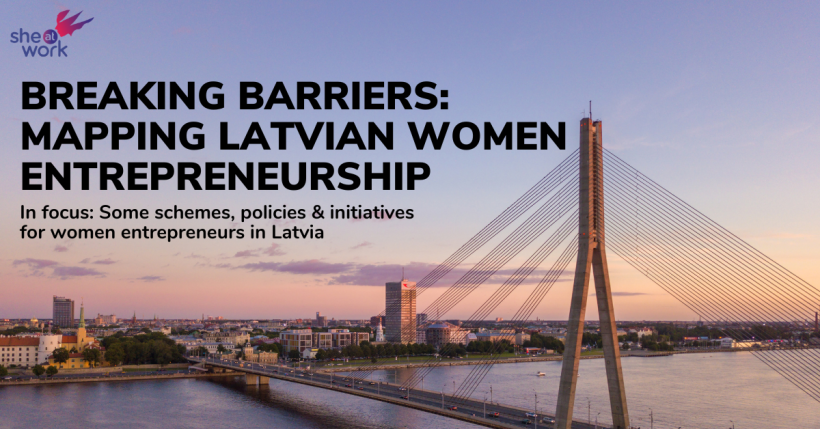In focus: Some schemes, policies & initiatives for women entrepreneurs in Latvia
#LatvianWomenEntrepreneurs #BalticBusiness #EmpoweringWomen #EntrepreneurshipSupport
Over the past two decades, Latvia’s economic journey has been nothing short of remarkable. From double-digit growth to a significant GDP decline and gradual resurgence, the country has weathered its share of economic storms. Through these turbulent times, the landscape of entrepreneurship in Latvia has evolved, responding dynamically to the changing macroeconomic conditions.
The Global Entrepreneurship Monitor paints a vivid picture of this transformation. Early- stage entrepreneurship in Latvia, which stood at around 4 – 5% during the early 2000s, more than doubled in the aftermath of the economic crisis, revealing a clear counter- cyclical trend. Notably, this surge in entrepreneurial activity was primarily driven by necessity, highlighting the resilience of the Latvian spirit in the face of adversity.
Among this wave of entrepreneurs, Latvian women have emerged as trailblazers. Studies from the Stockholm School of Economics indicate that a remarkable 10 percent of Latvian women, aged 18 to 64, have taken the plunge into entrepreneurship. Many of these women entrepreneurs helm small or micro-companies, collectively representing approximately 40% of all small and micro-businesses in Latvia.
As we delve deeper into the entrepreneurial landscape of Latvia, we will explore the government’s supportive measures, schemes & initiatives designed to empower and uplift women entrepreneurs. The Ministry of Welfare’s “Promotion of Equal Rights and Opportunities for Women and Men 2021-2023” plan, adopted in 2021, stands as a testament to Latvia’s commitment to fostering a thriving environment for women in business.
Join us on this journey through Latvia’s entrepreneurial spirit, where women are driving innovation, economic growth, and societal change.
> Entrepreneurship Policies
Entrepreneurship policies are generally under the responsibility of the Ministry of Economics and the Ministry of Environmental Protection & Regional Development. Even though not specifically targeted for women, other groups can benefit from such, more “general support” policies like – youth, older adults, immigrants or disabled persons. The State Employment Agency of Latvia and the Ministry of Welfare is responsible for the entrepreneurship policies with regard to unemployment.
A group-specific entrepreneurship strategy has been developed for unemployed within the framework of Strategy of the State Employment Agency of Latvia – employment framework – Inclusive employment strategy 2015-2020.
The Ministry of Economics seeks to develop a business-friendly environment that encourages and supports business creation and industrial development. It is also responsible for coordinating medium-term and long-term labour market policies. Recent initiatives include actions to reduce the costs associated with creating a business; and the Ministry is also focused on ensuring that new business start-ups and small companies are not disadvantaged in the tax system. Some key schemes include the “Innovation motivation programme”, “Business Incubator programme”.
Inclusive entrepreneurship strategies & objectives
Objectives and targets for business creation and self-employment by the unemployed and other key social target groups are outlined in the employment framework “Inclusive Employment Guidelines 2015-20,” which was approved by the Cabinet of Ministers in May 2015.
This framework was established to foster development of an inclusive labour market and includes two key policy objectives related to inclusive entrepreneurship:
(i) to increase self-employment and business start-up opportunities for registered unemployed; &
(ii) to promote social entrepreneurship, both as a labour market activity for various social target groups and also as a vehicle for supporting these groups in the labour market and society more generally.
The Ministry of Economics also offers a number of general entrepreneurship training but these offers are not tailored or targeted to people from under-represented or disadvantaged groups. One activity that is supported by Ministry of Economics and has gained major popularity in many regions is business incubators, which are typically support within programmes – to support business creation in the non-capital regions.
An entrepreneurship scheme for unemployed youth is offered as part of the Youth Guarantee programme (“Support for self-employed and starting business”). Offered since 2014 by the SEA, this scheme provides assistance with the preparation of business plans and a grant of up to EUR 3 000. In addition, it provides an allowance equal to the minimum wage for six months.
https://www.oecd.org/cfe/smes/Latvia-IE-2020.pdf
> Future Heroes
Future Heroes is a leadership and business development programme that supports teenage girls (15-19 years in Estonia and 13-17 years in Latvia) in the process of developing entrepreneurial projects for positive change, while developing entrepreneurial skills.
The programme was initially founded by the UK Department for International Trade, and support is given by the British Council and other non-governmental partners.
https://betterentrepreneurship.eu/en/content/future-heroes-estonia-latvia-lithuania
> Visa She’s Next grant program for woman entrepreneurs
Women are quite underrepresented among Latvian entrepreneurs, and make up less than 10 percent of the country’s start-up founders. To support women entrepreneurs facing this inequal landscape, Visa She’s Next grant program (in partnership with Luminor Bank and IFundWomen), has been set up to award six women-owned companies in the Baltics with EUR 10,000, plus one year of business coaching with Novatore.
It is important to note that in order to apply for a grant, the company must be registered in Latvia, it has to be in operation for at least one year, have a physical or digital location, and a woman must hold a stake of at least 51% in the company.
With She’s Next grant, the aim was to highlight the importance of women entrepreneurs and to focus resources where they are most needed – especially in challenging economic times. In fact, this grant program is targeted at women entrepreneurs who need capital to grow, manage or finance their small businesses.
https://labsoflatvia.com/en/news/applications-open-for-visa-shes-next
> NGO “Social Entrepreneurship Association of Latvia”
NGO “Social Entrepreneurship Association of Latvia” (SEAL) is a member organization – to promote the development of social entrepreneurship in Latvia. They bring together like-minded organizations, companies & people, who believe that social entrepreneurship in Latvia has huge potential and are also ready to participate in the development and strengthening of the sector.
The SEAL was founded in autumn 2015 and its founders are – the Foundation for Open Society DOTS, the Social Research Center PROVIDUS, the Latvian Samaritan Association, the charity store network ‘Otra Elpa’, social business accelerator ‘New Door’. They are organizations that had achieved a great deal in the field of research and promotion of social entrepreneurship. As the ‘pioneers’ of social entrepreneurship in Latvia, most importantly, they have proved with their work that social entrepreneurship in Latvia is necessary and possible.
https://sua.lv/en/who-we-are/










